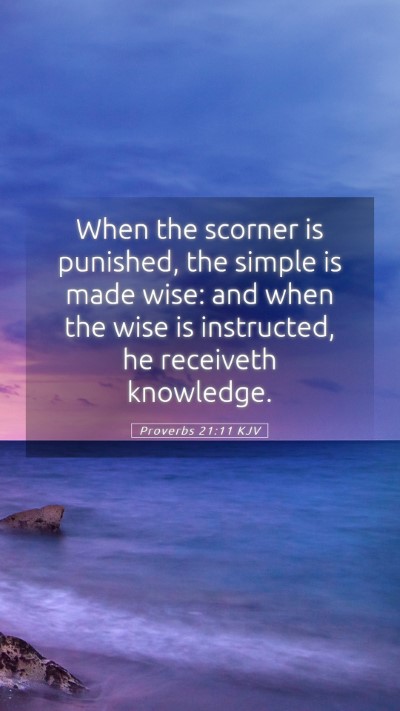Understanding Proverbs 21:11
Proverbs 21:11 states: "When the scoffer is punished, the simple is made wise; but when the wise is instructed, he receives knowledge." This verse serves as a profound reflection on the dynamics of learning and the consequences of our actions.
Bible Verse Meaning
This passage indicates that the behavior of the scoffer has a direct impact on others, particularly the simple, or those who are open to learning. The scoffer, representing those who mock or disdain the wisdom of instruction, faces the repercussions of their actions. When they are punished, it provides a lesson for others.
Insights from Public Domain Commentaries
Matthew Henry's Commentary
According to Matthew Henry, the emphasis lies on the ultimate outcome of correction and discipline. The judgment of the scoffer serves not only as a deterrent but also as a valuable teaching moment for the simple. Henry notes that this underscores the importance of accountability and the consequences that accompany folly. By witnessing the scoffer's punishment, the simple can gain valuable wisdom and learn to avoid similar paths.
Albert Barnes' Notes
Albert Barnes elaborates on the notion that the simple, or inexperienced, draws lessons from the fate of the scoffer. The punishment that befalls the scoffer is portrayed not merely as corrective but as an educational opportunity for others. Barnes draws attention to the contrast between the scoffer and the wise; while the scoffer dismisses wisdom, the wise embrace learning through experience, finding deeper understanding.
Adam Clarke's Commentary
Adam Clarke emphasizes the social implications of this proverb, suggesting that communal observations of punishment serve as warnings. He notes that the lesson conveyed through the scoffer’s fate can lead the simple to a deeper appreciation of wisdom, reinforcing the notion that life’s experiences—whether our own or others’—shape our understanding of righteousness and folly.
Biblical Exegesis and Analysis
The verse fundamentally underscores several themes relevant to biblical teachings:
- Consequence of Actions: Actions have repercussions, and witnessing the outcomes can lead to newfound wisdom.
- Learning from Others: The simple can gain insight from the folly of the scoffer, learning to discern correct behavior through observation.
- Value of Correction: The act of correction is valuable both for the person corrected and for those who observe it.
Application of Proverbs 21:11
In practical terms, this verse encourages us all to reflect on our actions, understanding that our behavior can serve as either a cautionary tale or a model for others. For Bible study groups, this offers a rich avenue for discussion on the importance of discipline, accountability, and the journey of gaining wisdom through experiences.
Related Bible Cross References
- Proverbs 1:7 - "The fear of the Lord is the beginning of knowledge; fools despise wisdom and instruction."
- Proverbs 9:7-8 - "Whoever corrects a scoffer gets himself abuse, and he who reproves a wicked man incurs injury."
- Proverbs 15:32 - "He who ignores discipline despises himself, but whoever heeds correction gains understanding."
Conclusion
In conclusion, Proverbs 21:11 encapsulates the wisdom of learning from the outcomes of one’s actions, particularly through the experiences of others. Engaging with scripture analysis allows us to deepen our understanding of these concepts, fostering both personal growth and communal learning. Utilizing various Bible study tools and resources, one can explore the layers of meaning embedded within verses like this one, enriching not just our own understanding but also that of our Bible study groups and lessons.


